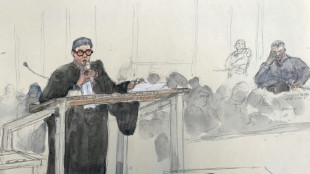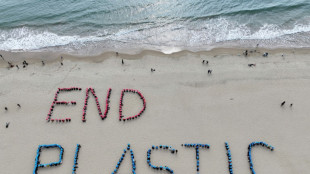
-
 Mexico says Trump tariffs would cost 400,000 US jobs
Mexico says Trump tariffs would cost 400,000 US jobs
-
Car-centric Saudi to open first part of Riyadh Metro

-
 Brussels, not Paris, will decide EU-Mercosur trade deal: Lula
Brussels, not Paris, will decide EU-Mercosur trade deal: Lula
-
Faeces, vomit offer clues to how dinosaurs rose to rule Earth

-
 Ruby slippers from 'The Wizard of Oz' up for auction
Ruby slippers from 'The Wizard of Oz' up for auction
-
Spain factory explosion kills three, injures seven

-
 US Fed's favored inflation gauge ticks up in October
US Fed's favored inflation gauge ticks up in October
-
Defence lawyers plead to judges in French mass rape trial

-
 US says China releases three 'wrongfully detained' Americans
US says China releases three 'wrongfully detained' Americans
-
New clashes in Mozambique as two reported killed

-
 Romania officials to meet over 'cyber risks' to elections
Romania officials to meet over 'cyber risks' to elections
-
Chelsea visit next stop in Heidenheim's 'unthinkable' rise

-
 Former England prop Marler announces retirement from rugby
Former England prop Marler announces retirement from rugby
-
Kumara gives Sri Lanka edge on rain-hit day against South Africa

-
 Namibia votes with ruling party facing toughest race yet
Namibia votes with ruling party facing toughest race yet
-
Spurs goalkeeper Vicario out for 'months' with broken ankle

-
 Moscow expels German journalists, Berlin denies closing Russia TV bureau
Moscow expels German journalists, Berlin denies closing Russia TV bureau
-
Spain govt defends flood response and offers new aid

-
 France says Netanyahu has 'immunity' from ICC warrants
France says Netanyahu has 'immunity' from ICC warrants
-
Nigerian state visit signals shift in France's Africa strategy

-
 Stock markets waver as traders weigh Trump tariffs, inflation
Stock markets waver as traders weigh Trump tariffs, inflation
-
Tens of thousands in Lebanon head home as Israel-Hezbollah truce takes hold

-
 Opposition candidates killed in Tanzania local election
Opposition candidates killed in Tanzania local election
-
Amorim eyes victory in first Man Utd home game to kickstart new era

-
 Fresh fury as Mozambique police mow down protester
Fresh fury as Mozambique police mow down protester
-
Defeat at Liverpool could end Man City title hopes, says Gundogan

-
 Indonesians vote in regional election seen as test for Prabowo
Indonesians vote in regional election seen as test for Prabowo
-
Guardiola says no intent to 'make light' of self harm in post-match comments

-
 New EU commission gets green light to launch defence, economy push
New EU commission gets green light to launch defence, economy push
-
Opposition figures killed as Tanzania holds local election

-
 Taiwan Olympic boxing champion quits event after gender questions
Taiwan Olympic boxing champion quits event after gender questions
-
European stocks drop on Trump trade war worries

-
 Volkswagen to sell operations in China's Xinjiang
Volkswagen to sell operations in China's Xinjiang
-
FA probes referee David Coote over betting claim

-
 Serbia gripped by TV series about murder of prime minister
Serbia gripped by TV series about murder of prime minister
-
Putin seeks to shore up ties on visit to 'friendly' Kazakhstan

-
 New EU commission pushes for defence and economy spending
New EU commission pushes for defence and economy spending
-
Plastic pollution talks must speed up, chair warns

-
 Pakistan web controls quash dissent and potential
Pakistan web controls quash dissent and potential
-
1,000 Pakistan protesters arrested in pro-Khan capital march

-
 ICC prosecutor seeks arrest warrant for Myanmar junta chief
ICC prosecutor seeks arrest warrant for Myanmar junta chief
-
Philippine VP's bodyguards swapped out amid investigation

-
 EasyJet annual profit rises 40% on package holidays
EasyJet annual profit rises 40% on package holidays
-
Ukraine sees influx of Western war tourists

-
 Greeks finally get Thessaloniki metro after two-decade wait
Greeks finally get Thessaloniki metro after two-decade wait
-
New EU commission to get all clear with big push on defence and economy

-
 Thousands of Lebanese head home as Israel-Hezbollah truce takes hold
Thousands of Lebanese head home as Israel-Hezbollah truce takes hold
-
Australia takes step to ban under 16s from social media

-
 Volkswagen says to sell operations in China's Xinjiang
Volkswagen says to sell operations in China's Xinjiang
-
Japan prosecutor bows in apology to former death row inmate


Duterte unlikely to face court over Philippines drug war killings
Philippine President Rodrigo Duterte often incited violence and ordered police to shoot dead suspects in a drug war that has killed thousands. But analysts say he is unlikely to face charges after he steps down Thursday.
Duterte's signature policy to rid the country of drugs has been widely condemned and sparked an international probe into a possible crime against humanity.
But the 77-year-old is still hugely popular among many in the Philippines who support his quick-fix solutions to crime, and he remains a potent political force.
Last month's election results reinforced Duterte's bulwark against potential prosecution after he leaves office, analysts said.
Ferdinand Marcos Jr, son of the country's late dictator, won the presidency after striking a powerful alliance with Duterte's daughter, Sara, who was elected vice president.
Marcos Jr has backed Duterte's drug war and signalled his government will not cooperate with the International Criminal Court's (ICC) investigation into the killings.
"The election basically decided that there would not be a serious investigation into President Rodrigo Duterte's role in the drug war for the next six years," said Greg Wyatt, director for business intelligence at PSA Philippines Consultancy.
A self-professed killer, Duterte told officers to fatally shoot narcotics suspects if their lives were at risk.
He defended the crackdown, saying it had saved families and prevented the Philippines from turning into a "narco-politics state".
Government data show more than 6,200 people have died in police anti-drug operations since Duterte was swept to power in 2016.
Rights groups say Duterte created a climate of impunity and estimate that tens of thousands have been killed by police, hitmen and vigilantes, even without proof they were involved in drugs.
Only three policemen have been convicted for slaying a drug suspect.
Under pressure from the UN Human Rights Council and the ICC, the government has examined around 300 cases of drug operations that led to deaths.
Justice Secretary Menardo Guevarra told AFP in October that a review of 52 cases had cast doubt on the officers' common claim of self-defence.
Charges have been filed in five cases.
Lawyers representing families of victims have vowed to take legal action against Duterte in the Philippines after June 30.
But they admit the odds are stacked against them.
"We are not that hopeful but it's worth a shot," said Edre Olalia, president of the National Union of Peoples' Lawyers.
Olalia said it can take years for a case to be resolved in the creaky judicial system. And lawyers struggle to gain access to evidence held by police.
- 'Window dressing' -
A major challenge to mounting a case against Duterte will be the Ombudsman he appointed, said jailed Duterte critic and Senator Leila de Lima.
"His clout with the present Ombudsman, the only official authorised to file charges against him in relation to the EJKs (extra-judicial killings), survives even after he leaves office," de Lima said in a statement to AFP.
The last hope for many families seeking justice is the ICC, said Carlos Conde, a senior researcher at Human Rights Watch.
ICC judges authorised a full-blown investigation into the anti-narcotics campaign in September, saying it resembled an illegitimate and systematic attack on civilians.
It suspended the probe two months later, after Manila said it was looking into the alleged crimes.
Conde said the government was trying to "hoodwink" the international community, particularly the ICC.
"A lot of what they've been doing is just window dressing, they are just trying to buy time," he said.
ICC prosecutor Karim Khan announced Friday that he intended to resume his probe into the drug war "as quickly as possible", saying Manila's request to defer the investigation was unjustified.
Duterte has refused to cooperate with The Hague-based court, claiming it has no jurisdiction.
He pulled the Philippines out of the ICC in 2019 after it launched a preliminary investigation into his drugs crackdown.
Even if the ICC gathers enough evidence to bring a case against Duterte, its rules prevent him from being tried in absentia.
"ICC, I know you're listening, stop the drama that you'll indict me," Duterte said Thursday, offering to act as a lawyer for anyone in uniform who shoots dead a criminal after he leaves office.
Another option for justice was an "unofficial truth commission", said Ruben Carranza, a senior expert at the New York-based International Center for Transitional Justice.
Carranza, who was previously involved in efforts to recover money and assets stolen by the Marcoses, said it would allow families of drug war victims to tell their stories.
"In a country like the Philippines," he said, "I think it's important to fight for the truth whenever it's possible."
S.Keller--BTB
